Picture this: you’re sipping your morning coffee, scanning the news, when suddenly, you stumble upon a headline that jolts you awake. It reads, “Can CPS talk to my child alone?” Your heart skips a beat as you ponder this perplexing question. What happens when the mysterious Child Protective Services (CPS) knocks on your door and wants to have a little chat with your child?
Well, fret not, curious reader, because we’re about to embark on a journey to demystify this enigma. In this blog, we’ll not only answer that burning question with a resounding “Yes!” but we’ll also dive into the depths of CPS interviews with children. It’s a rollercoaster of legal intricacies, child advocacy superheroes, sneaky interview techniques, emotional rollercoasters, and more!
So, Can CPS Talk to Your Child Alone?
Yes, they can! And the reasons behind it will keep you glued to this page. We’re about to spill the beans on the legal age, interview techniques, child privacy, emotional well-being, and a whole lot more. Hold onto your hats, because this is going to be one thrilling ride!
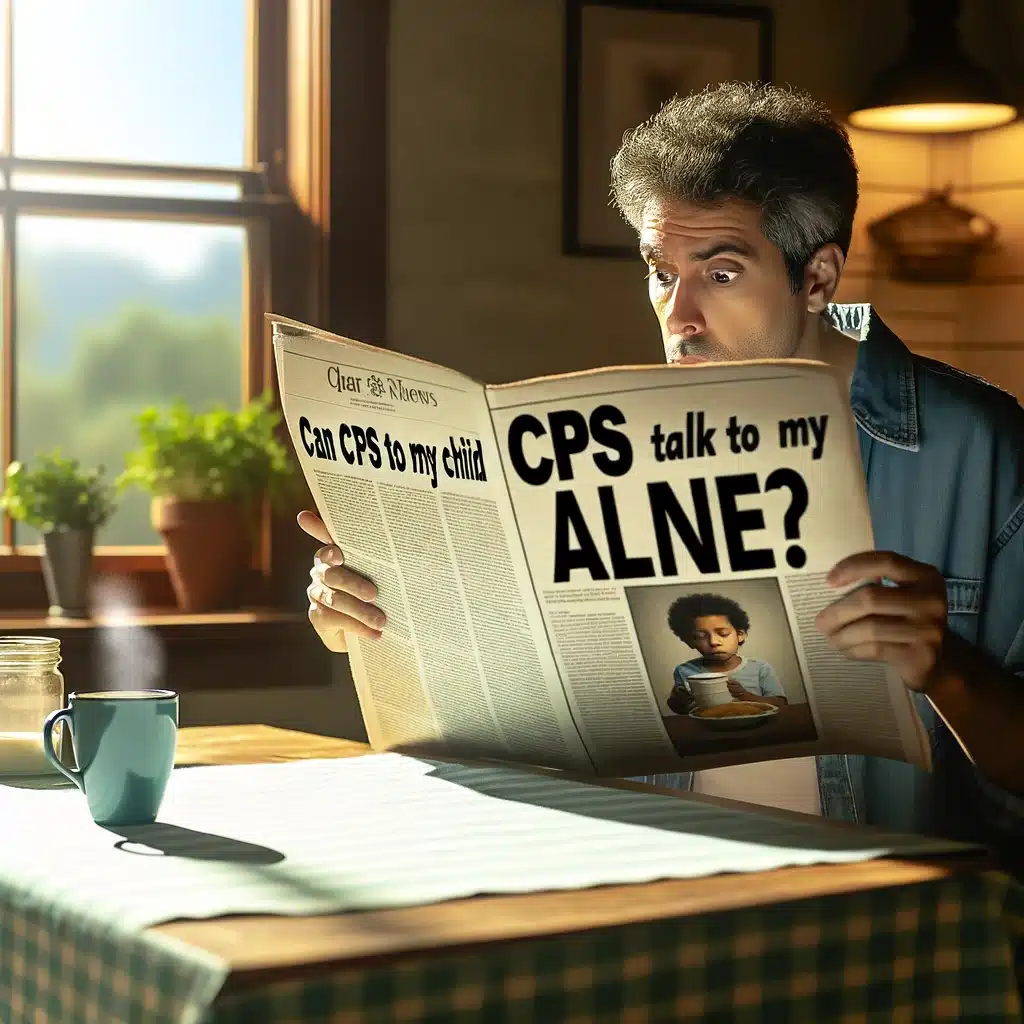
Can CPS Talk to My Child Alone: Understanding CPS Investigations and Your Rights
The Key Question in CPS Investigations: Can CPS Talk to My Child Alone?
As a parent, your primary concern is your child’s safety and well-being. When Child Protective Services (CPS) steps in, a critical question arises: “Can CPS talk to my child alone?” This article delves into the intricacies of CPS and Department of Homeland Security (DHS) procedures for interviewing children during investigations. We aim to provide clear, SEO-optimized information to help parents understand their rights and the CPS process.
How to Prepare for a CPS Interview in Texas: Understanding the Dynamics of Child Welfare
Changes in family dynamics and societal stressors have significantly influenced Child Protective Services (CPS) operations in Texas. These shifts have led to an increase in CPS reports, affecting caseloads, resources, and approaches to child welfare investigations. This section delves into these changes and how they impact CPS processes, with a focus on preparing for a CPS interview in Texas. It includes key considerations about whether CPS can interview children without parental presence, offering guidance on navigating these situations effectively.
Beyond the Basics: Excelling in CPS Interviews under Texas Law
In this detailed section, we explore the specific procedures and protocols that CPS follows during investigations to maintain fairness and thoroughness. It’s essential for parents to understand these steps, from the initial report to the final decision, to navigate the system effectively. This guide provides an in-depth analysis of each stage of a CPS investigation, offering valuable insights into what families can expect. Special emphasis is placed on scenarios where CPS might conduct interviews with a child alone, ensuring parents are well-informed and prepared.
|
CPS Procedures and Protocols |
Description |
|
1. Initial Report |
When CPS receives a report of possible child abuse or neglect, it initiates an investigation to determine the validity of the claims. |
|
2. Information Gathering |
CPS caseworkers collect information from various sources, including interviews with family members, teachers, neighbors, and other relevant parties. |
|
3. Decision-making Process |
Based on the information gathered, CPS evaluates the level of risk to the child’s safety and decides whether further intervention is necessary. |
|
4. Assessment |
A comprehensive assessment of the child’s living environment, family dynamics, and support systems is conducted to make informed decisions. |
|
5. Case Plan |
If concerns are substantiated, a case plan is developed in collaboration with the family to address any safety issues and support the child’s well-being. |
|
6. Monitoring and Review |
CPS continues to monitor the family’s progress and periodically reviews the case plan to ensure the child’s safety and well-being. |
Can CPS Talk to My Child Alone? Knowing Your Rights in CPS Investigations
Understanding Your Rights in CPS Cases
In any Child Protective Services (CPS) investigation, it’s vital for parents to know their rights, particularly regarding the question: “Can CPS talk to my child alone?” Being well-informed about your legal rights and protections is essential in navigating these complex situations. A critical right for parents is seeking legal representation. An experienced CPS attorney can guide you through the case, ensuring your rights, including those related to your child’s interviews with CPS, are protected.
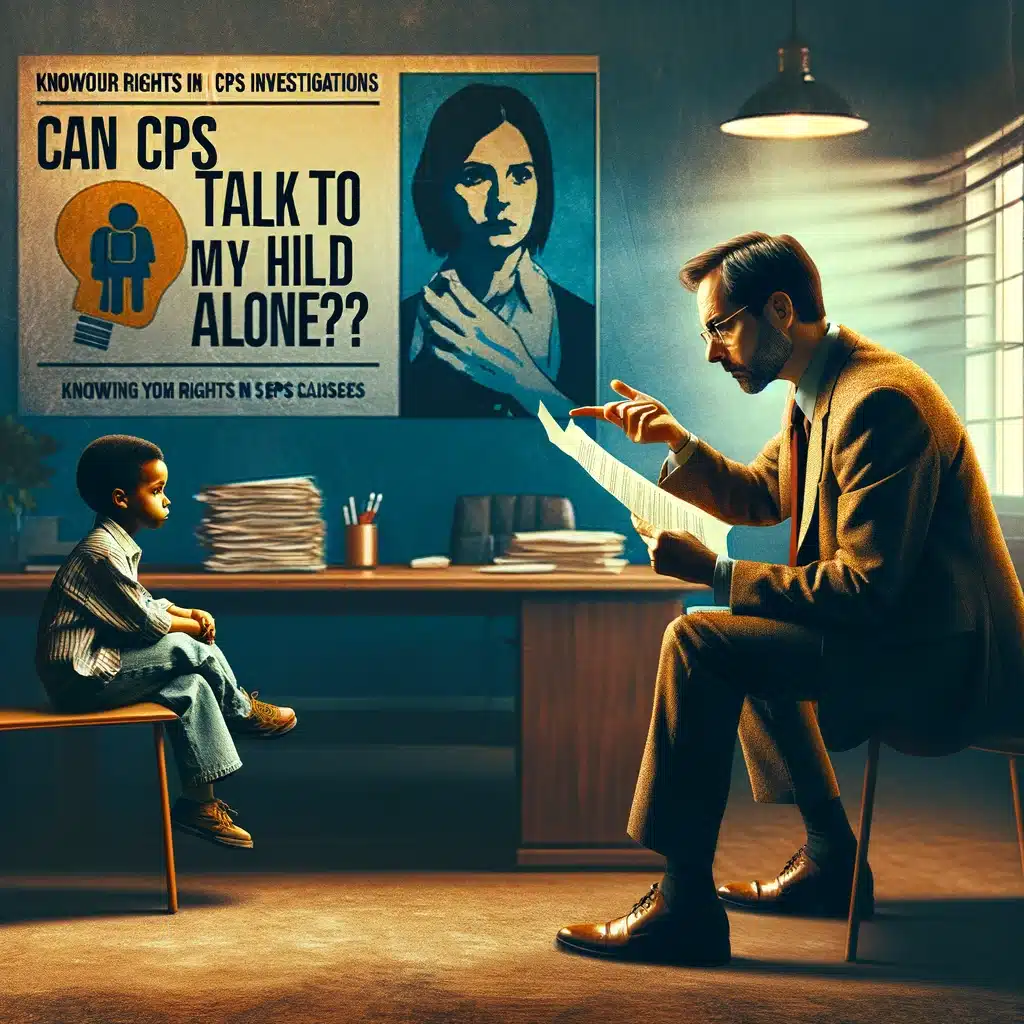
The Importance of Legal Representation in CPS Investigations
Having a CPS attorney is crucial in safeguarding your parental rights and achieving a favorable outcome for your family. Your attorney will clarify the legal intricacies of the CPS investigation, especially concerning issues like whether CPS can interview your child without you. They ensure you provide accurate and appropriate responses to CPS inquiries.
Family Reunification: A Primary Goal in CPS Cases
At the heart of CPS investigations is the aim of family reunification. If your child is removed from your home during the investigation, understanding the reunification process becomes essential. Comprehending this process, including scenarios where CPS might speak to your child alone, provides guidance and comfort in challenging times. Cooperating with CPS and fulfilling their requirements is key to reuniting your family.
Understanding the Role and Training of CPS Caseworkers
CPS caseworkers play a pivotal role in the investigation. Knowing about their roles, training, and decision-making processes offers insight into your case’s progression and outcome. These caseworkers are tasked with gathering information, which may involve talking to your child independently. Familiarizing yourself with their methods can improve your ability to navigate the investigation effectively.
Can CPS Talk to My Child Alone? Navigating False Allegations and CPS Investigations
Understanding False Allegations in CPS Investigations
False allegations can lead to Child Protective Services (CPS) investigations, causing distress and uncertainty for families. It’s important to recognize the possibility of false claims. Knowing how to address them is crucial in protecting your family’s well-being, especially when considering whether CPS can talk to your child alone during these investigations.
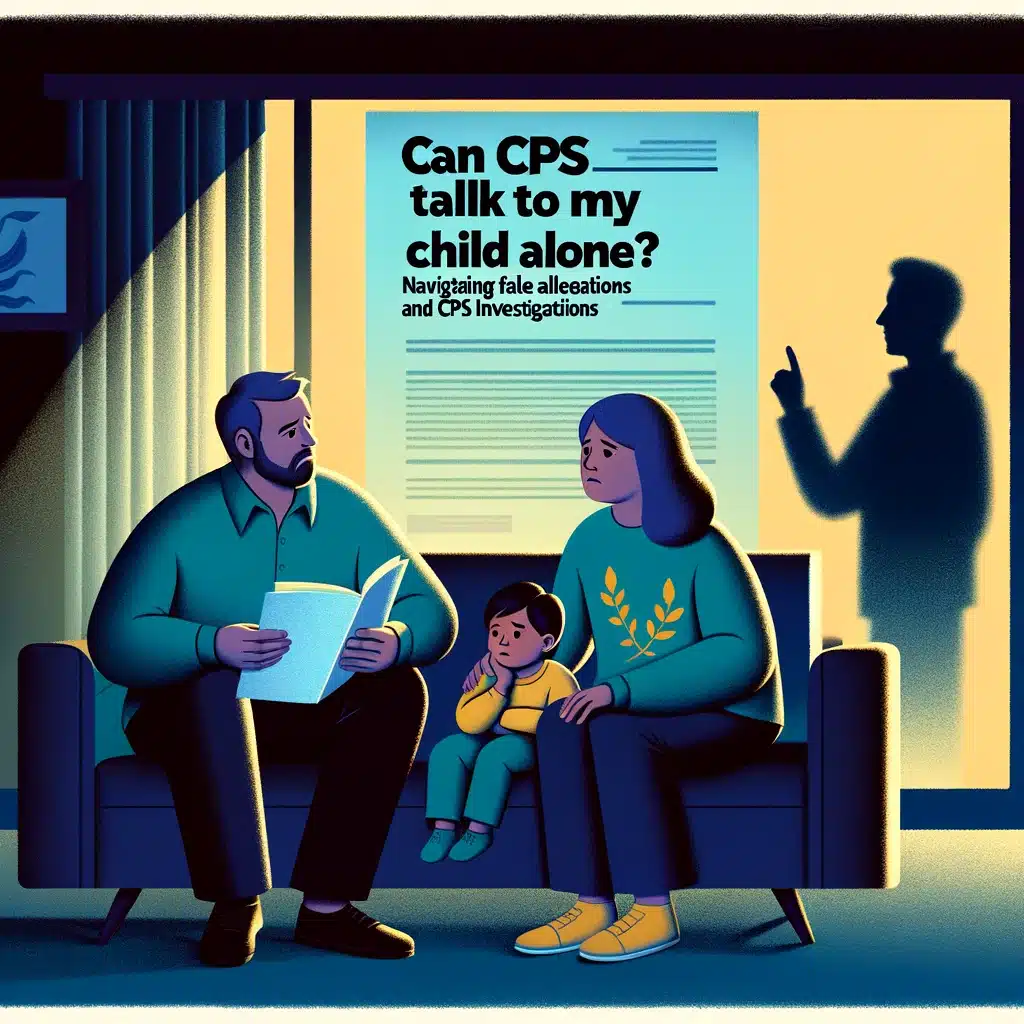
Child Abuse Prevention and Education: A Key to Community Safety
Child abuse prevention programs and educational initiatives play a vital role in community safety. By understanding and promoting these initiatives, families can contribute to creating a safer environment for children. This includes awareness of the protocols, such as if and when CPS can talk to a child alone, ensuring child safety in all aspects.
The Emotional Impact of CPS Investigations on Children
The impact of CPS investigations is profound on children, affecting them emotionally, psychologically, and academically. It’s crucial to consider how these investigations, including interviews conducted by CPS, can affect their well-being and sense of security. A sensitive approach to whether CPS can talk to children alone is necessary for their emotional and psychological health.
Support Services for Families During CPS Investigations
Families undergoing CPS investigations often need extra support. Access to counseling, therapy, and parenting classes is vital. These services provide guidance during challenging times and play a crucial role in the family’s journey towards reunification and resolution. Understanding the rights and processes, such as the conditions under which CPS can interact with children, is part of this support system.
Can CPS Talk to My Child Alone: Addressing Overrepresentation and Understanding CPS Interviews
Addressing Overrepresentation in CPS Cases
Analyzing Child Protective Services (CPS) cases often highlights the overrepresentation of certain communities. This issue underscores the need for equitable treatment and systemic improvements to ensure fair and unbiased investigations. An important question that arises in this context is: “Can CPS talk to my child alone?” Understanding how this practice may disproportionately affect specific communities is crucial for advocating for fairer CPS procedures.
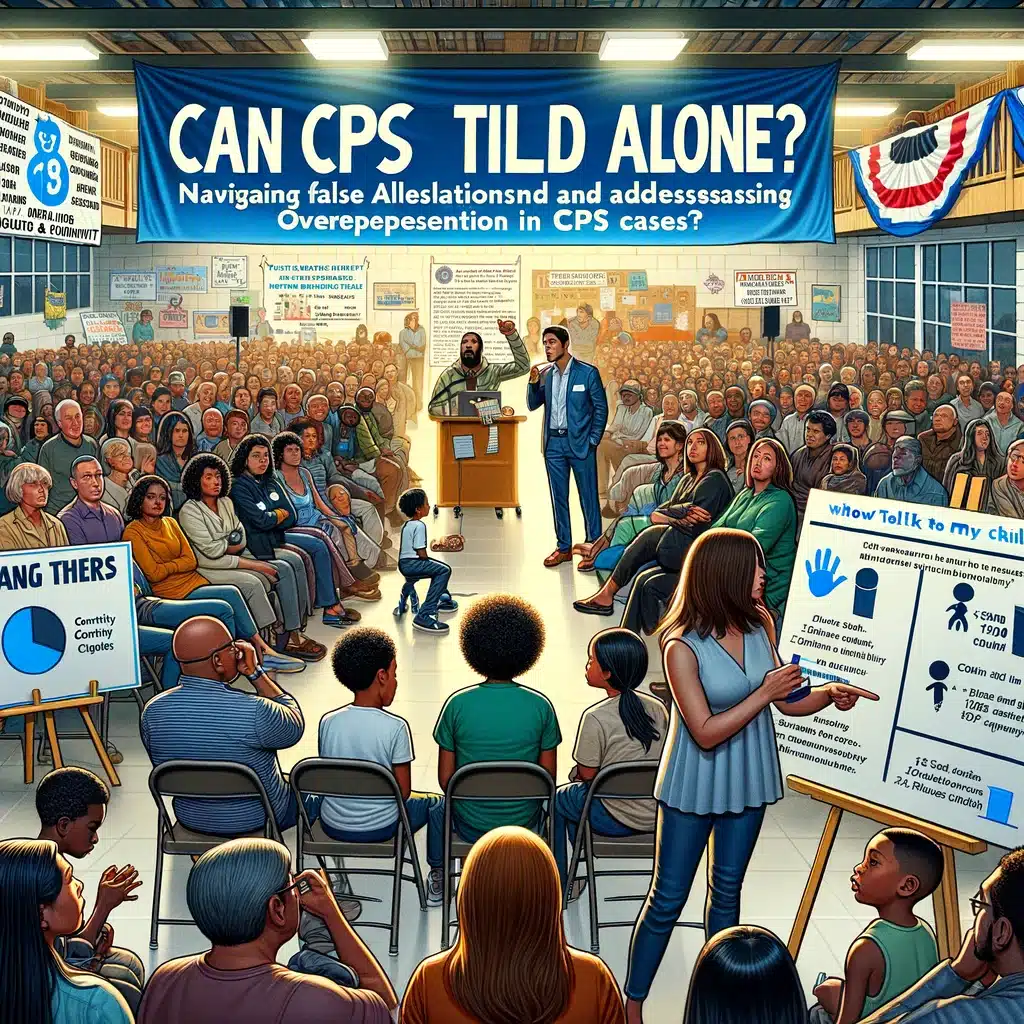
What to Know About Your Child Being Interviewed: Long-Term Effects of CPS Involvement
The involvement of CPS can have ramifications that go beyond the scope of the initial investigation, often resulting in enduring impacts on families and children. Understanding these potential long-term consequences is crucial, particularly when it comes to sensitive procedures such as CPS conducting interviews with children alone. This knowledge is vital for creating a support system aimed at maintaining the well-being of both families and children, helping them navigate and cope with the aftermath of CPS involvement.
Comprehensive Insight into CPS Interviews with Children
Child Protective Services (CPS) and the Department of Homeland Security (DHS) involvement raises numerous questions, notably “Can CPS talk to my child alone?” This article provides a thorough exploration of CPS interviews, covering legal frameworks, interview techniques, and considerations for child advocacy, privacy, emotional well-being, and education.
Facing CPS Interviews in Texas: Expert Advice and Real-Life Stories – Understanding Legal Age and Consent in Child Interviews
This section focuses on the pivotal aspects of legal age and consent in CPS interviews with children. Parents frequently express concerns about whether their children can legally engage in conversations with CPS or DHS without parental consent, and the potential consequences of these interactions. We will thoroughly examine the legal framework that allows CPS to speak with children alone, emphasizing crucial points that parents need to be mindful of in such situations.
Can CPS Talk to My Child Alone: Understanding Interview Techniques and Child Advocacy
Child Interview Techniques in CPS and DHS Investigations
To create a safe and non-traumatic experience, CPS (Child Protective Services) and DHS (Department of Homeland Security) utilize specific methods during child interviews. A common concern among parents is understanding these techniques, especially when asking, “Can CPS talk to my child alone?” This section provides insight into the approaches used to ensure interviews are conducted empathetically and effectively.
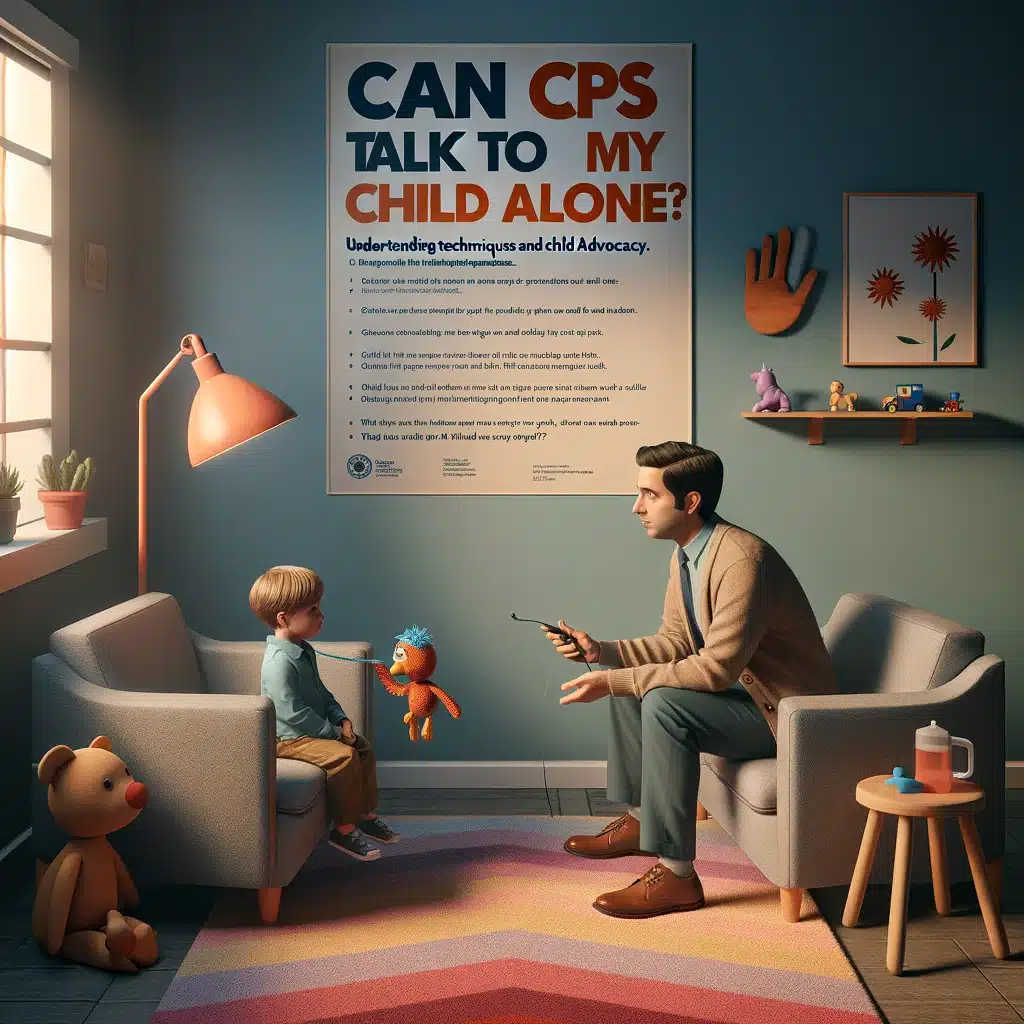
The Role of Child Advocacy Groups in CPS Investigations
Numerous organizations are dedicated to protecting children’s rights and welfare during CPS investigations. This part of the article will highlight the role of these advocacy groups, particularly in situations where CPS may interview a child without parental presence. Understanding their involvement offers reassurance about the protection of children’s interests.
Ensuring Child Privacy and Confidentiality During Investigations
Maintaining privacy and confidentiality is crucial in interviews involving children by CPS and DHS. This section explores the measures implemented to safeguard a child’s privacy and ensure the confidentiality of their statements. Here, we also discuss scenarios where CPS might need to talk to a child alone and the protocols in place to protect the child’s rights.
Supporting a Child’s Emotional Well-being in CPS Cases
The emotional well-being of children is a critical focus during CPS investigations. This portion of the article delves into how CPS and DHS assess and support a child’s emotional state, particularly when they might need to conduct interviews with the child alone. Understanding these support mechanisms is key to appreciating the comprehensive care provided during these investigations.
Can CPS Talk to My Child Alone: Balancing Education and Rights During CPS Involvement
Impact of CPS Involvement on a Child’s Education
Child Protective Services (CPS) investigations can significantly disrupt a child’s education. In this section, we’ll examine the effects of CPS involvement on schooling and discuss strategies to minimize educational disruptions. A key question that arises in this context is, “Can CPS talk to my child alone?” and how such interactions might impact a child’s academic life.
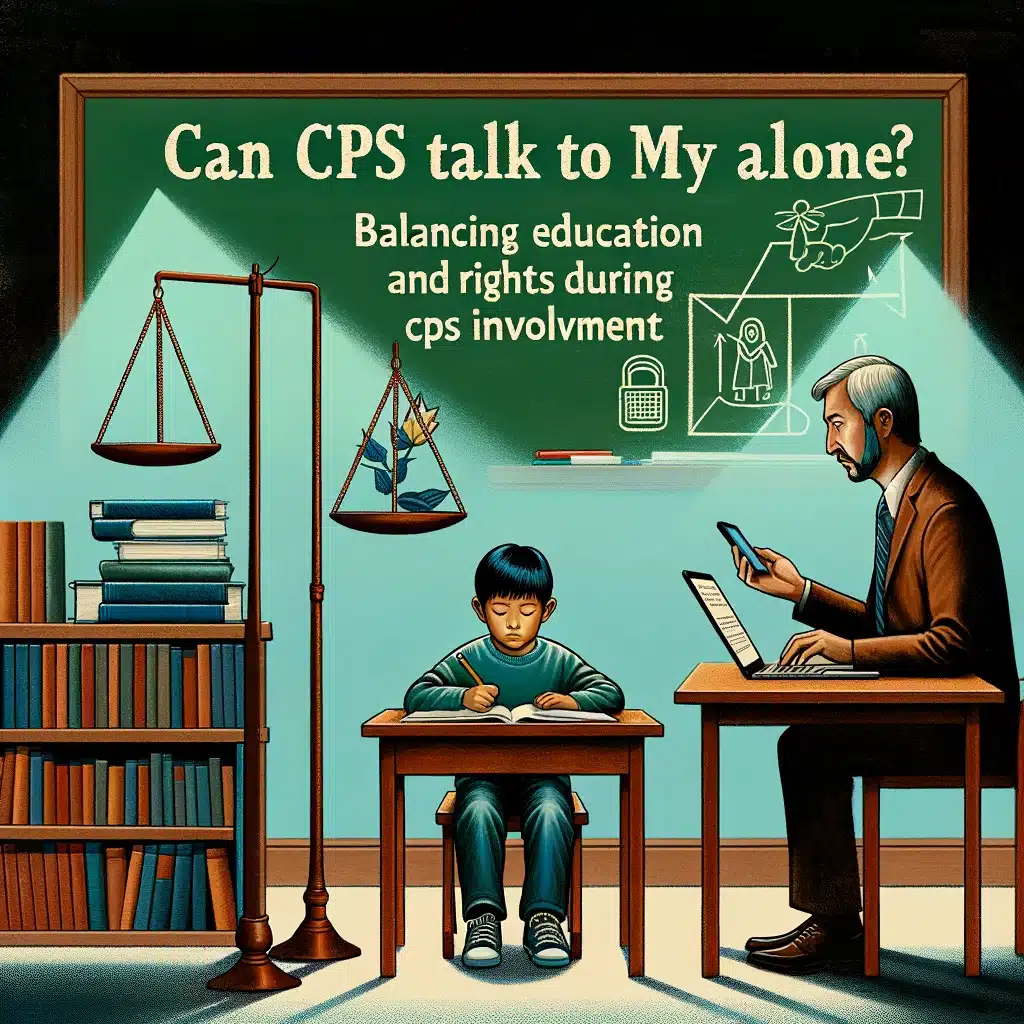
The Importance of Cross-Agency Collaboration in CPS Cases
Effective collaboration between CPS and other professionals, such as therapists and counselors, is essential for supporting children during investigations. This part of the article will delve into how these collaborations contribute to a child’s overall well-being, including considerations for scenarios where CPS might need to interview a child alone.
Understanding a Child’s Rights During CPS and DHS Interviews
Children have specific rights during interviews with Child Protective Services (CPS) or the Department of Homeland Security (DHS). One crucial right is the child’s ability to have a trusted adult present during interviews. We’ll explore these rights in detail, focusing on their importance in the context of whether CPS can talk to a child alone, and how this practice aligns with a child’s legal protections.
|
Child’s Rights in Interviews |
|
Right |
Description |
|
Presence of a Trusted Adult |
Children have the right to have a trusted adult, such as a parent or guardian, present during interviews with CPS or DHS. |
|
Privacy and Confidentiality |
CPS and DHS must ensure the child’s privacy and maintain confidentiality during interviews and investigations. |
|
Non-Coercion |
Children should not be coerced or forced into providing information or statements during interviews. |
|
Comfortable Environment |
Interviews should take place in a comfortable and non-threatening environment to reduce stress and anxiety for the child. |
|
Respectful Treatment |
Children have the right to be treated with respect and dignity throughout the interview process. |
Can CPS Talk to My Child Alone: A Child-Centered Approach in CPS Investigations
Emphasizing a Child-Centered Approach in CPS Investigations
The child-centered approach in Child Protective Services (CPS) investigations is crucial. This section explores how this methodology prioritizes the child’s best interests, including addressing the critical question, “Can CPS talk to my child alone?” We will discuss how prioritizing the child’s needs may influence decisions about conducting interviews without parental presence.
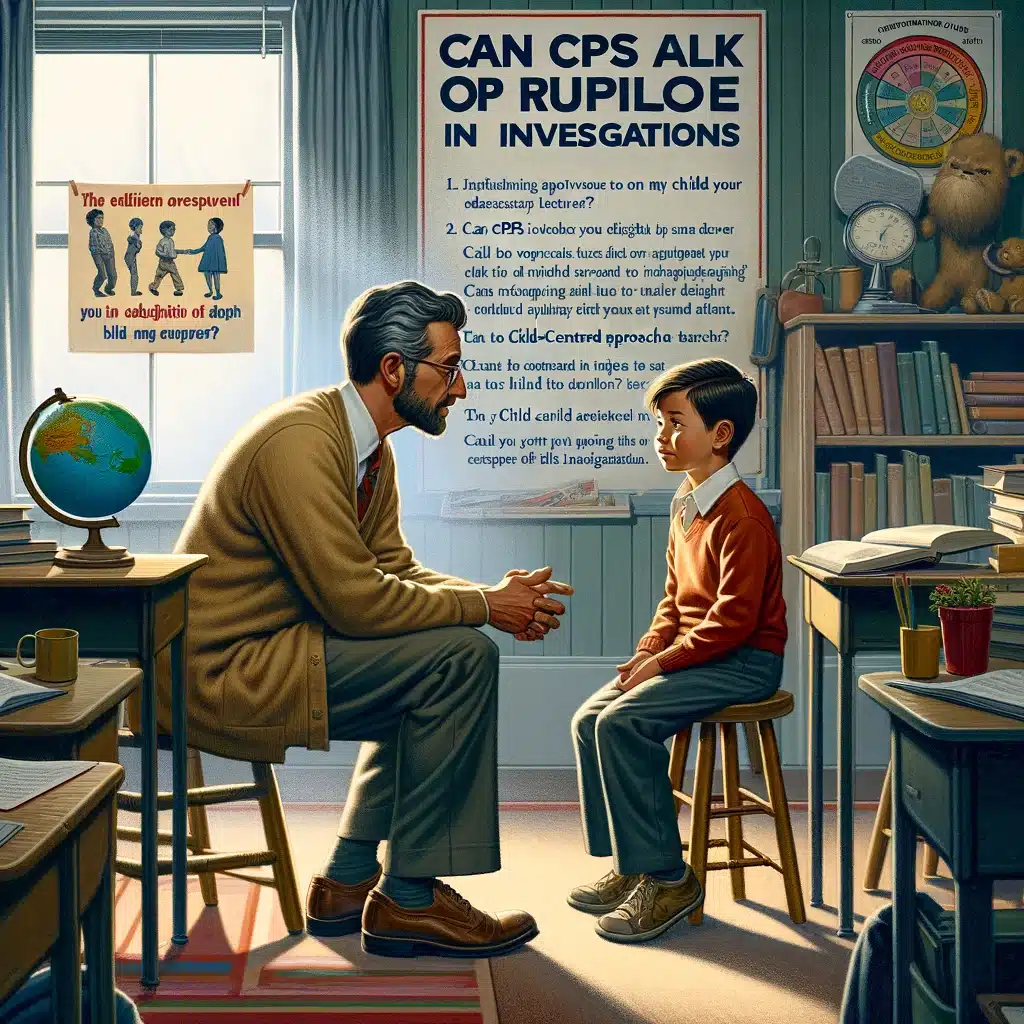
The Impact of CPS Investigations on Siblings
CPS investigations can affect not just the targeted child but also their siblings. In this part, we will uncover how CPS considers the well-being of siblings, particularly in contexts where there might be a need for CPS to talk to siblings alone. This includes a discussion on the strategies employed to minimize the impact on siblings during these investigations.
Cultural Sensitivity in CPS Investigations
Cultural sensitivity plays a vital role in CPS investigations, especially in cases involving diverse family backgrounds. We will delve into why cultural awareness is imperative for conducting fair and respectful investigations. This includes how cultural considerations impact various aspects of the investigation, such as the decision-making process regarding whether CPS can talk to a child alone.
Repercussions for Making False Accusations in CPS Cases
False or malicious allegations in CPS or Department of Homeland Security (DHS) cases can lead to severe consequences. This final section will explain the repercussions for individuals who make such accusations. It will also touch upon the implications of these false allegations, particularly in situations where they lead to CPS conducting interviews with a child without parental supervision.
Can CPS Talk to My Child Alone: Supporting Parents Through CPS Investigations
Support Services for Parents During CPS Investigations
Parents undergoing investigations by Child Protective Services (CPS) often need significant support and guidance. In this section, we’ll explore the range of support services and resources available to assist parents during these challenging times. This includes discussing how understanding CPS policies, like whether CPS can talk to a child alone, is crucial for parents navigating the system.
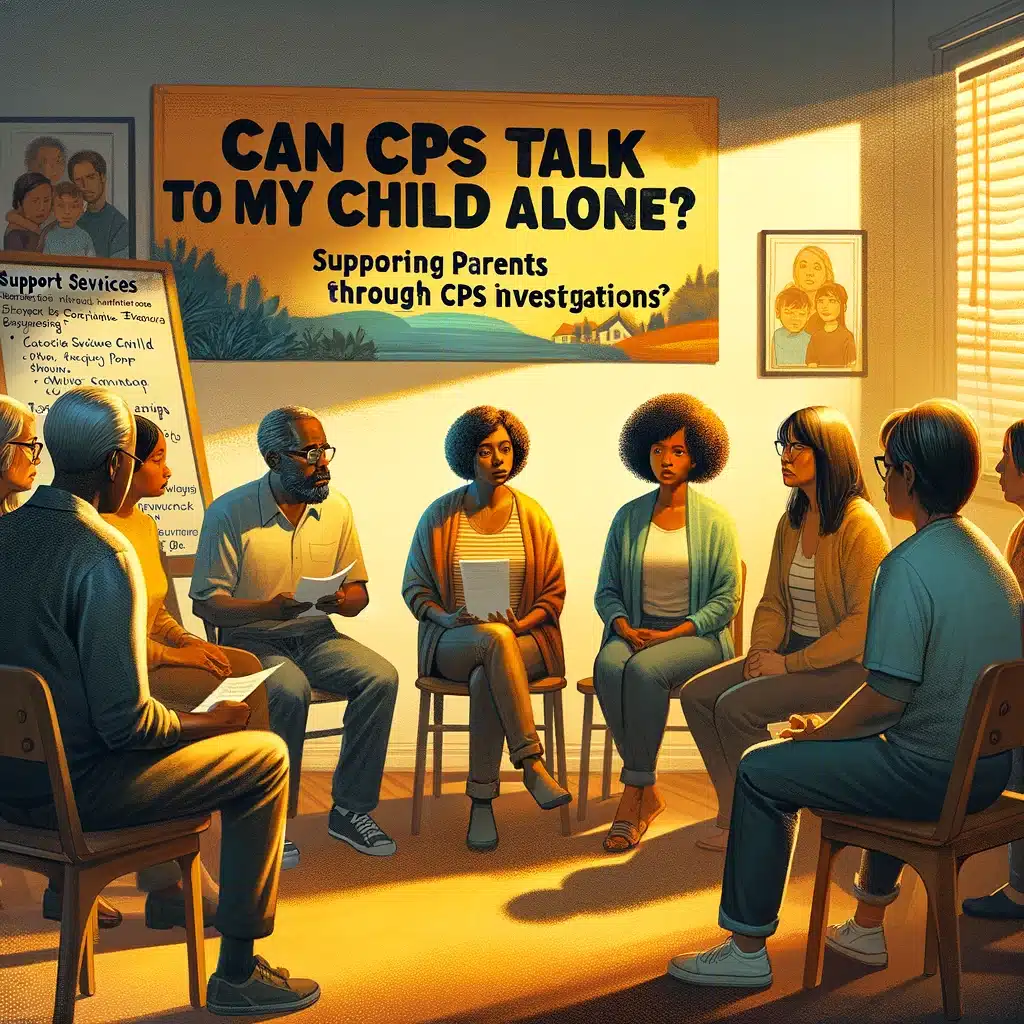
The Importance of Parental Cooperation in CPS Cases
Cooperation between parents and CPS or DHS can greatly impact the outcome of an investigation. We’ll delve into the benefits of parental cooperation, including how it influences decisions like CPS conducting interviews with children independently, and its overall impact on the investigation’s outcome.
Training and Resources for CPS Caseworkers
CPS caseworkers are central to child protection efforts. This part of the article will uncover the training and resources provided to CPS professionals to ensure they are well-prepared for handling cases, especially in situations where they might need to talk to a child alone.
Estate Planning for High Net-Worth Individuals in Texas: Understanding Foster Care and Alternative Placements in CPS Investigations
When a child is temporarily removed from their home during CPS investigations, comprehending the ensuing steps becomes crucial. This segment focuses on foster care and alternative placement options available for children in these scenarios. We will explore how such decisions are made, including the involvement and role of CPS, particularly in cases where they conduct interviews with children without parental involvement. This insight is particularly relevant for high net-worth individuals in Texas who are navigating the complexities of CPS investigations and the foster care system.
Providing Psychological Support for Children in CPS Investigations
The emotional impact on children involved in CPS investigations is a critical concern. This section focuses on the availability of psychological support and counseling services to help children cope, particularly in light of experiences like being interviewed alone by CPS or DHS.
Can CPS Talk to My Child Alone: Addressing Child Abuse Reporting and Long-Term Follow-Up
Understanding Child Abuse Reporting Obligations
Individuals like teachers and healthcare professionals are often legally obligated to report suspected child abuse to Child Protective Services (CPS). In this section, we will clarify these reporting obligations, their significance, and discuss the related question, “Can CPS talk to my child alone?” This includes exploring how reports from these professionals might lead to CPS conducting independent interviews with children.
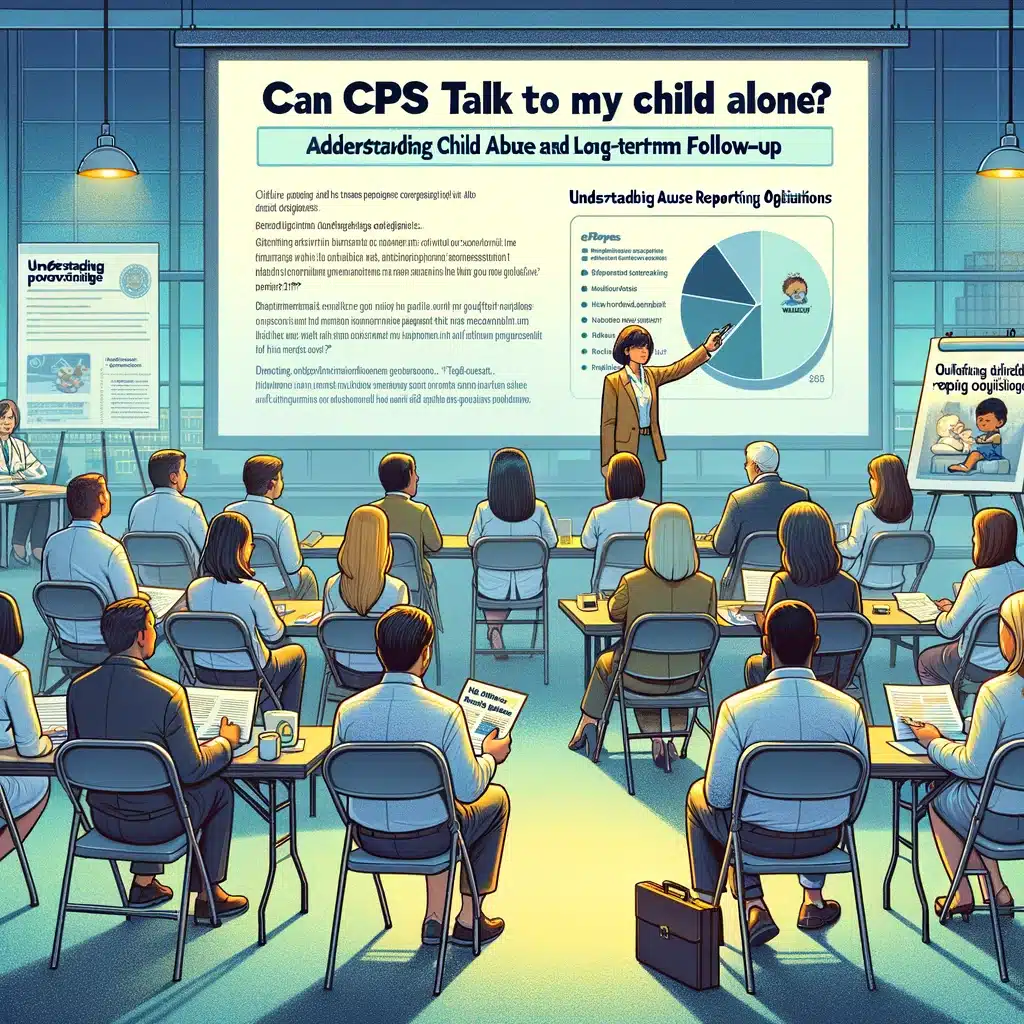
The Child’s Voice in CPS Decision-Making
Ensuring that a child’s voice is heard in decisions impacting their welfare is crucial. We’ll explore how CPS may involve the child in these processes, particularly addressing the key question of whether CPS can talk to the child alone as part of considering their perspective in decision-making.
The Importance of Long-Term Follow-Up After CPS Involvement
CPS involvement can have enduring effects on families and children. This section is dedicated to the importance of long-term follow-up and support following the conclusion of a CPS investigation. It will also discuss the implications of practices like interviewing children alone on their long-term well-being and the support systems in place to mitigate any negative impacts.
Conclusion: Advocating for the Little Heroes
As we reach the final chapter of our epic journey into the world of CPS interviews with children, it’s time for a heartwarming tale. Imagine a child, once caught in the whirlwind of a CPS investigation, now standing tall with a bright future ahead. This isn’t a fairy tale; it’s a testament to the power of understanding, cooperation, and advocacy.
So, dear reader, remember this – when CPS talks to a child alone, it’s not just a chat; it’s an opportunity to protect, nurture, and empower our little heroes. These young souls, with their dreams and aspirations, deserve nothing less.
As you bid adieu to this blog, carry with you the knowledge that you hold the key to support, change, and brighter tomorrows for these children. Keep advocating for child rights, keep questioning the norms, and keep shining a light on the path to a safer, happier world for our future generations.
And as we sign off with a tip of our imaginary hat, we leave you with this thought: in the grand story of life, each child is a hero in the making, and together, we can write the most incredible tales of resilience, hope, and triumph. Until next time, keep those capes flying high
CPS Investigations: Key Questions Answered
FAQs
-
Can CPS use your past against you?
CPS can consider past incidents if they are relevant to the current investigation and the safety of the child.
-
What questions does CPS ask references?
CPS may ask about the child’s welfare, the parent’s behavior, and the family’s living conditions, among other topics.
-
Can CPS interview my child at school in Texas?
Yes, CPS can interview a child at school as part of their investigation, often without parental consent.
-
Why would CPS take a child in Texas?
CPS may remove a child if they believe the child is in immediate danger or the environment is unsafe.
-
How do you act around CPS?
Be cooperative, honest, and calm. Understand your rights and consider seeking legal advice.
-
Should I answer CPS questions?
It’s generally advisable to cooperate with CPS, but you have the right to seek legal advice before answering.
-
Is CPS evidence based?
CPS investigations are based on evidence gathered during the investigation process.
-
What are 5 common questions you could ask as part of your reference investigation?
1. How do you know the individual? 2. Can you describe their relationship with their child? 3. Have you noticed any concerning behaviors? 4. How does the individual handle stress? 5. Can you provide examples of positive interactions they’ve had with their child?
Bryan Fagan, a native of Atascocita, Texas, is a dedicated family law attorney inspired by John Grisham’s “The Pelican Brief.” He is the first lawyer in his family, which includes two adopted brothers. Bryan’s commitment to family is personal and professional; he cared for his grandmother with Alzheimer’s while completing his degree and attended the South Texas College of Law at night.
Married with three children, Bryan’s personal experiences enrich his understanding of family dynamics, which is central to his legal practice. He specializes in family law, offering innovative and efficient legal services. A certified member of the College of the State Bar of Texas, Bryan is part of an elite group of legal professionals committed to ongoing education and high-level expertise.
His legal practice covers divorce, custody disputes, property disputes, adoption, paternity, and mediation. Bryan is also experienced in drafting marital property agreements. He leads a team dedicated to complex family law cases and protecting families from false CPS allegations.
Based in Houston, Bryan is active in the Houston Family Law Sector of the Houston Bar Association and various family law groups in Texas. His deep understanding of family values and his professional dedication make him a compassionate advocate for families navigating Texas family law.




